
The England national football team have represented England in international football since the first international match in 1872. It is controlled by The Football Association (FA), the governing body for football in England, which is affiliated with UEFA and comes under the global jurisdiction of world football's governing body FIFA. England competes in the three major international tournament contested by European nations: the FIFA World Cup, the UEFA European Championship and the UEFA Nations League.

The Germany national football team represents Germany in men's international football and played its first match in 1908. The team is governed by the German Football Association, founded in 1900. Between 1949 and 1990, separate German national teams were recognised by FIFA due to Allied occupation and division: the DFB's team representing the Federal Republic of Germany, the Saarland team representing the Saar Protectorate (1950–1956) and the East Germany team representing the German Democratic Republic (1952–1990). The latter two were absorbed along with their records; the present team represents the reunified Federal Republic. The official name and code "Germany FR (FRG)" was shortened to "Germany (GER)" following reunification in 1990.
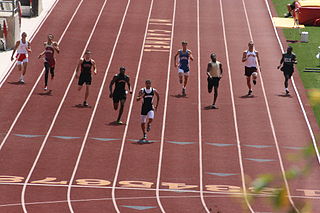
The 400 metres, or 400-meter dash, is a sprint event in track and field competitions. It has been featured in the athletics programme at the Summer Olympics since 1896 for men and since 1964 for women. On a standard outdoor running track, it is one lap around the track. Runners start in staggered positions and race in separate lanes for the entire course. In many countries, athletes previously competed in the 440-yard dash (402.336 m)—which is a quarter of a mile and was referred to as the "quarter-mile"—instead of the 400 m (437.445 yards), though this distance is now obsolete.

The 100 metres, or 100-meter dash, is a sprint race in track and field competitions. The shortest common outdoor running distance, the 100-meter (109.36 yd) dash is one of the most popular and prestigious events in the sport of athletics. It has been contested at the Summer Olympics since 1896 for men and since 1928 for women. The inaugural World Championships were in 1983.

The 200 metres, or 200-meter dash, is a sprint running event. On an outdoor 400 metre racetrack, the race begins on the curve and ends on the home straight, so a combination of techniques is needed to successfully run the race. A slightly shorter race, called the stadion and run on a straight track, was the first recorded event at the ancient Olympic Games. The 200 m places more emphasis on speed endurance than shorter sprint distances as athletes predominantly rely on anaerobic energy system during the 200 m sprint. Similarly to other sprint distances, the 200 m begins from the starting blocks. When the sprinters adopt the 'set' position in the blocks they are able to adopt a more efficient starting posture and isometrically preload their muscles. This enables them to stride forwards more powerfully when the race begins and start faster.
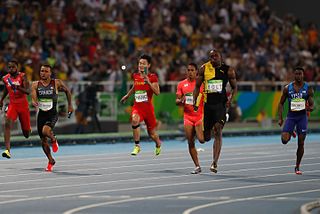
The 4 × 100 metres relay or sprint relay is an athletics track event run in lanes over one lap of the track with four runners completing 100 metres each. The first runners must begin in the same stagger as for the individual 400 m race. Each runner carries a relay baton. Before 2018, the baton had to be passed within a 20 m changeover box, preceded by a 10-metre acceleration zone. With a rule change effective November 1, 2017, that zone was modified to include the acceleration zone as part of the passing zone, making the entire zone 30 metres in length. The outgoing runner cannot touch the baton until it has entered the zone, and the incoming runner cannot touch it after it has left the zone. The zone is usually marked in yellow, frequently using lines, triangles or chevrons. While the rule book specifies the exact positioning of the marks, the colours and style are only "recommended". While most legacy tracks will still have the older markings, the rule change still uses existing marks. Not all governing body jurisdictions have adopted the rule change.
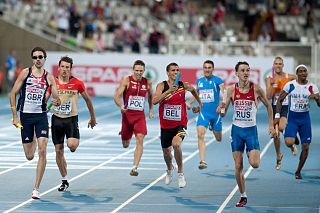
The 4 × 400 metres relay or long relay is an athletics track event in which teams consist of four runners who each complete 400 metres or one lap. It is traditionally the final event of a track meet. At top class events, the first leg and the first bend of the second leg are run in lanes. Start lines are thus staggered over a greater distance than in an individual 400 metres race; the runners then typically move to the inside of the track. The slightly longer 4 × 440 yards relay, on an Imperial distance, was a formerly run British Commonwealth and American event, until metrication was completed in the 1970s.
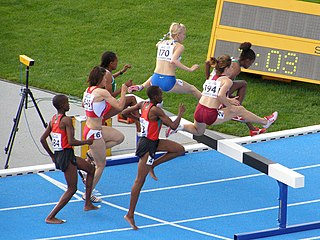
The World Athletics U20 Championships is a biennial world championships for the sport of athletics organised by the World Athletics, contested by athletes in the under-20 athletics age category (19 years old or younger on 31 December in the year of the competition.

The ICC Men's T20 World Cup, is the Twenty20 International cricket tournament, organised by the International Cricket Council (ICC) since 2007.
The European Junior Swimming Championships is an annual swimming competition for European swimmers organized by the Ligue Européenne de Natation and held over five days. The competitor age for females was 15 to 16 years; for males it is 17 to 18 years until 2015. From 2016 the competitor age is for females 14 to 17 years and for males 15 to 18 years.

The Yas Marina Circuit is the venue for the Abu Dhabi Grand Prix. The circuit was designed by Hermann Tilke, and is situated on Yas Island, near Abu Dhabi, the capital of the United Arab Emirates. Yas Marina was the second of four Formula One tracks in the Middle East, with the first being in Bahrain and subsequent tracks in Qatar and Saudi Arabia.

The Diamond League is an annual series of elite track and field athletic competitions comprising fifteen of the best invitational athletics meetings. The series sits in the top tier of the World Athletics one-day meeting competitions.
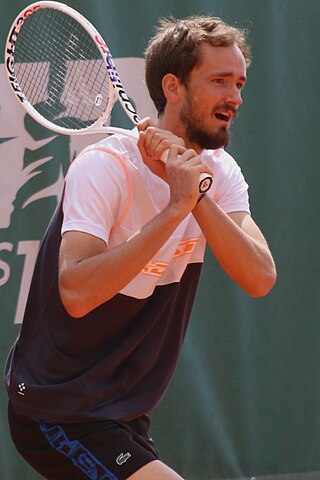
Daniil Sergeyevich Medvedev is a Russian professional tennis player. He has been ranked as high as world No. 1 in men's singles by the Association of Tennis Professionals (ATP), and is the current world No. 4. Medvedev has won 20 ATP Tour singles titles, including the 2021 US Open and 2020 ATP Finals. Medvedev defeated world No. 1 Novak Djokovic in the final to deny him the Grand Slam. In the latter, he became the only player to defeat the top three ranked players in the world en route to the year-end championship title. He has also won six Masters titles and contested six major finals. His six Masters titles all came in different venues, making him only the sixth player to win Masters titles at six different venues.
The Joburg Ladies Open is a women's professional golf tournament held in Johannesburg, South Africa. It is an event on the Southern Africa-based Sunshine Ladies Tour since 2015 and starting in 2022 co-sanctioned with the Ladies European Tour.
The NACAC U20 Championships in Athletics is an bi-annual championships to athletes under-20 years of age in the year of competition held between the member associations of the North American, Central American and Caribbean Athletic Association (NACAC). The inaugural edition took place in 2021 in San José, Costa Rica.











